Are you dreaming of French Polynesia’s turquoise waters and lush landscapes? A big question comes up: Do you need a visa for French Polynesia? Knowing the visa requirements and entry rules is key for a great trip. This guide helps you understand the entry rules so you can enjoy your time in paradise.
Key Takeaways
- Tourist visa requirements vary based on nationality.
- U.S. citizens typically do not need a visa for short stays.
- Understanding French Polynesia entry rules is vital for smooth travel.
- Specific circumstances may alter visa requirements.
- Health and safety regulations should be reviewed before travel.
Overview of French Polynesia
French Polynesia is home to over 100 islands, with Tahiti being the most populous and the administrative center. It’s famous for its stunning coral reefs, warm climate, and rich culture. This makes it a top choice for those looking for a tropical paradise.
The overview of french polynesia travel shows the area’s natural beauty and local traditions. Knowing the french polynesia travel regulations is key to a safe and enjoyable trip. It helps avoid any legal issues during your visit.
Tourism is a big part of the local economy, making it important for visitors to follow local rules. Understanding the standards and practices of French Polynesia will make your trip better.
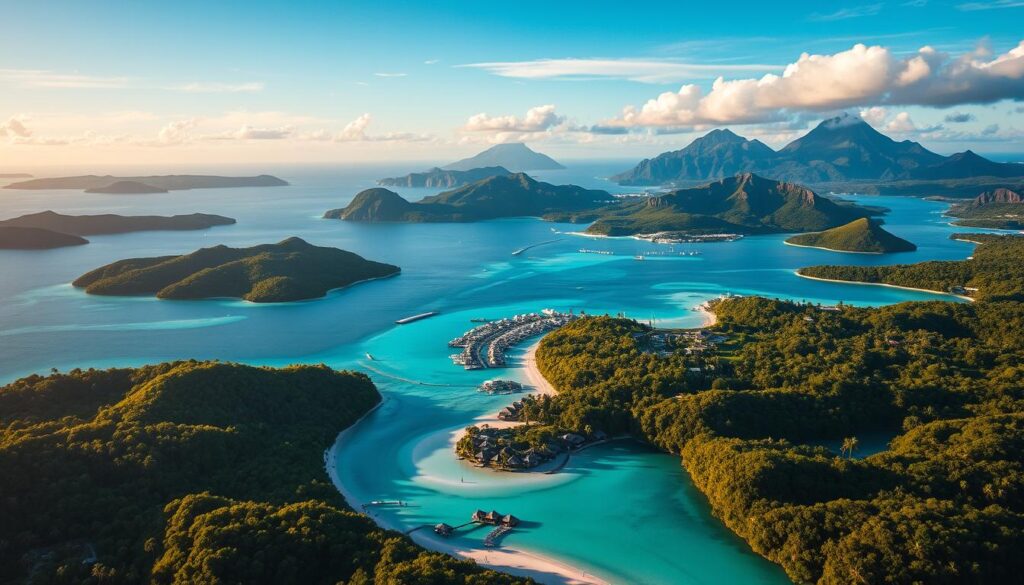
| Aspect | Description |
|---|---|
| Climate | Warm tropical climate year-round, ideal for beach activities and exploration. |
| Culture | A blend of Polynesian traditions with French influence, evident in festivals and cuisine. |
| Economy | Strongly dependent on tourism, agriculture, and fishing, with a focus on sustainable initiatives. |
| Recreation | Opportunities for snorkeling, diving, hiking, and enjoying unique local performances. |
Visa Requirements for French Polynesia
Planning a trip to French Polynesia? Knowing the visa rules is key for a smooth journey. U.S. citizens usually don’t need a visa for visits under 90 days in six months. This makes French Polynesia a great choice for your next getaway.
But, if you’re planning to work or study there, things get a bit more complicated. You’ll need to apply for a specific visa in advance. This can be done at a French consulate or embassy. Getting your documents right early can prevent travel hassles.
Travelers from countries with health entry rules should also pay attention. Meeting health requirements can make your entry into French Polynesia easier.
In short, understanding French Polynesia’s visa rules is vital for your trip. Knowing this can make your visit more enjoyable. You’ll have more time to explore the beautiful landscapes and culture of the islands.
Do You Need a Visa for French Polynesia? Entry Rules Explained
Travelers planning a trip to French Polynesia often seek clarity on visa regulations. Generally, a french polynesia tourist visa is not required for short stays. Tourists can enter without a visa, provided they present documents proving onward travel and accommodations. It’s important to note that specific visa exemptions for french polynesia may not apply if your purposes involve studying, working, or doing business in the region.
Tourist Visas and Exemptions
While most tourists can avoid a visa for short visits, verifying relevant french polynesia visa information is advisable. Entry rules can differ based on nationality, so ensuring compliance with local regulations is key. Notably, those with intentions beyond leisure may need to secure the appropriate visa type before arriving.
Visa Application Process
The french polynesia visa application process requires specific documentation. You will need a valid passport, travel itinerary, and potentially a letter detailing the purpose of your stay. Those planning longer visits, or activities deemed non-touristic, must ensure submission of the visa application for french polynesia to the nearest French consulate or embassy well ahead of travel. Processing times can vary, so early planning is key.
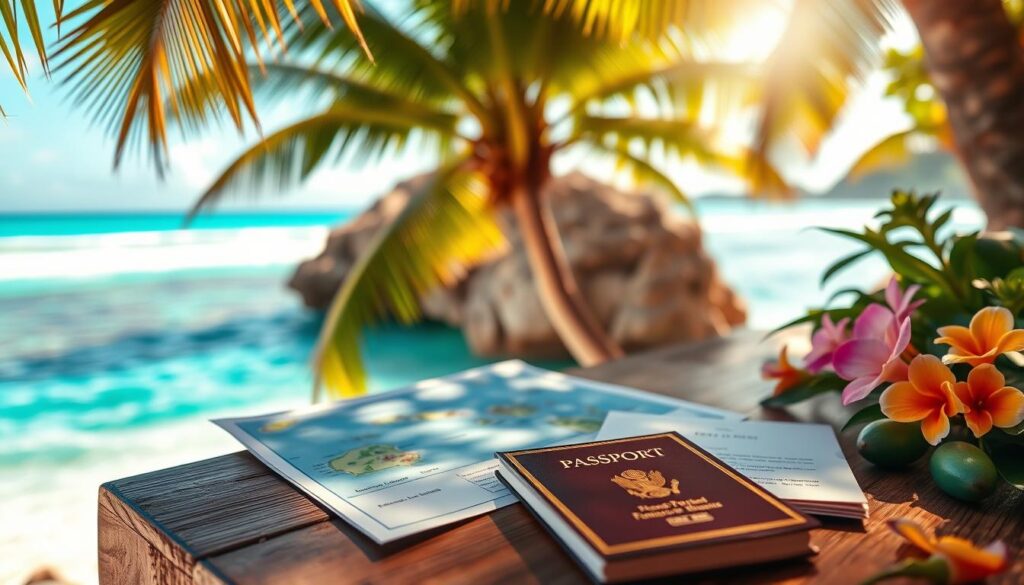
Traveling on a U.S. Passport
Planning a trip to French Polynesia? U.S. citizens need to know the entry rules. Knowing these rules helps make your trip smooth.
Entry Rules for U.S. Citizens
U.S. citizens don’t need a visa to enter French Polynesia. This rule applies if you have a regular tourist passport. Your passport must be valid for three months after you leave the islands. Knowing this helps avoid travel problems.
Duration of Stay and Conditions
U.S. citizens can stay in French Polynesia for up to 90 days. This time lets you see the beautiful sights and do fun activities. Remember, you can’t stay more than 90 days in six months. If you plan to stay longer, you might need a visa.
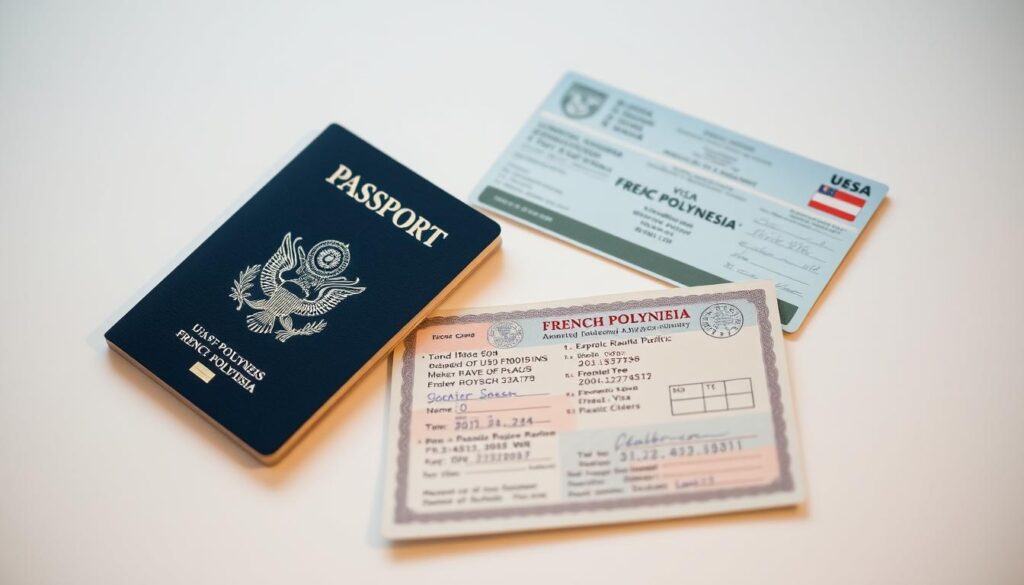
To follow the entry rules, keep your travel plans up to date. Also, stay informed about any changes in entry rules before you go.
Special Circumstances for Non-Tourist Travel
Before you start your work or study trip in French Polynesia, you need to know the visa requirements. If you’re going to work in French Polynesia or study in French Polynesia, you must get the right papers. This is to follow the local laws.
Work and Study in French Polynesia
To work in French Polynesia, you need a work visa that matches your job. It’s important to plan early and contact the French consulate for all the details. You’ll need to show proof of your job and letters from your employer.
If you want to study in French Polynesia, you must show you’re enrolled in a school. There are special visa requirements for studying, based on how long you’ll stay and what you’re studying. Talking to schools in the area can help you understand these rules better.
Requirements for Scientific Research
For scientific research in French Polynesia, you have to take a different route. First, get permissions from the right people, including your research plan. Start this process early, as it can take a while.
Getting a research visa is part of your journey. Knowing the research visa requirements will help make the application easier. This way, you can focus on your research goals.
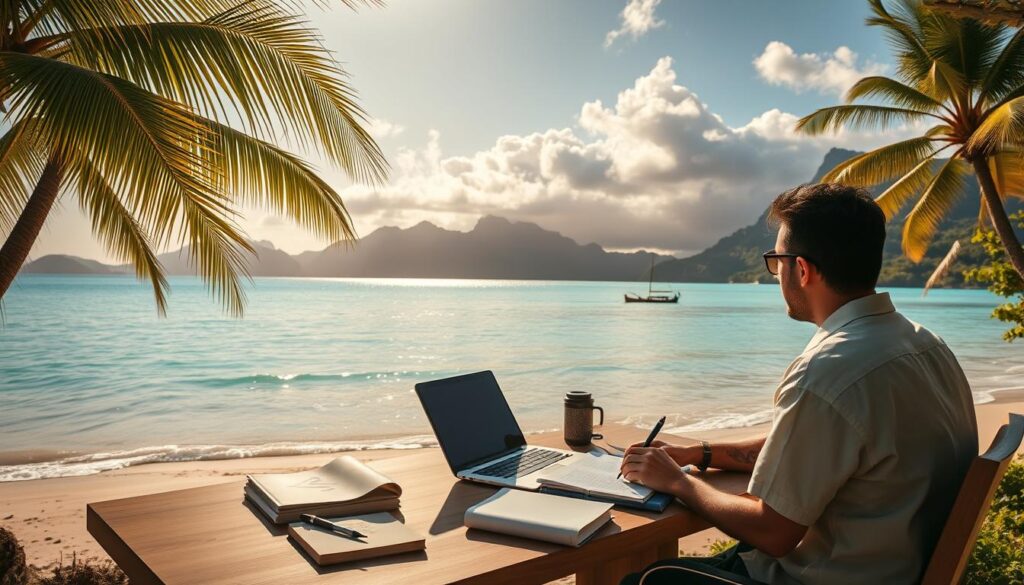
Health and Safety Considerations
When planning your trip to French Polynesia, knowing the local health and safety is key. The french polynesia health regulations are generally good, with most islands having decent medical services. But, the quality and availability of these services can vary, more so on remote islands.
It’s wise to get vaccinated before you go. You’ll need shots for hepatitis A and typhoid. Talking to a doctor before your trip is a good idea. They can make sure you’re ready for your travels.
Carry your essential medicines in your carry-on. Also, bring a copy of your prescriptions. This is a smart move for your health.
Emergency evacuations can be expensive. Getting medical evacuation insurance is a smart choice, even more so for remote places. It protects you from big medical bills and gives you peace of mind.
Here’s a quick guide to health tips for French Polynesia:
| Health Considerations | Recommendations |
|---|---|
| Vaccinations | Hepatitis A, Typhoid |
| Medical Facilities | Varies by island, Tahiti offers more services |
| Medical Insurance | Consider getting medical evacuation insurance |
| Emergency Contacts | Keep emergency numbers and local hospital info handy |
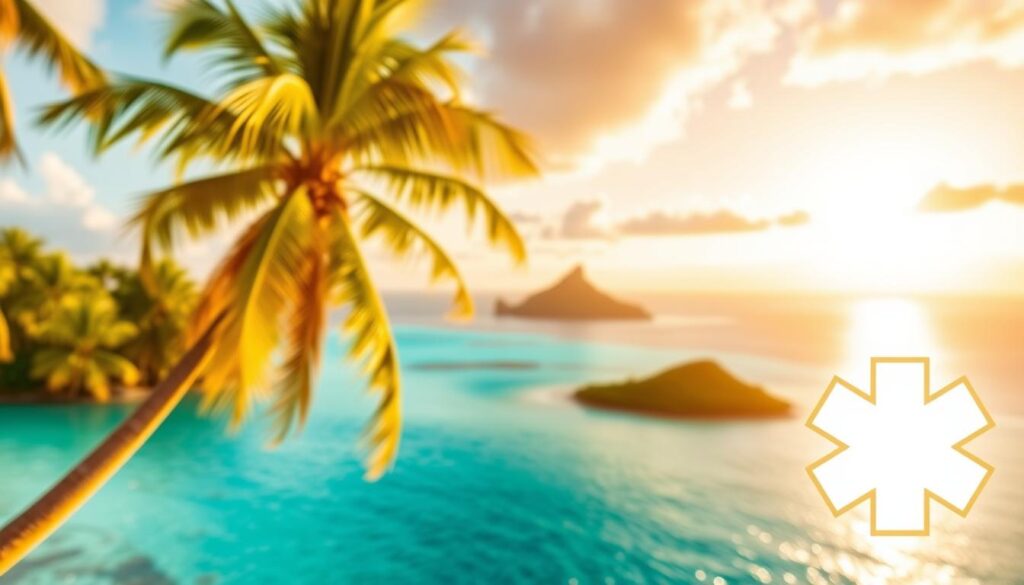
By following these safety tips for travelers, you’ll have a safer and more enjoyable trip. French Polynesia is a beautiful place to visit.
Customs Regulations for French Polynesia
It’s important to know the customs rules for French Polynesia if you plan to bring items there. These rules help keep the local area safe and protect the economy. Knowing what you can and can’t bring will help you avoid trouble at customs.
Goods You Can and Cannot Bring
When you travel to French Polynesia, here are some things to remember:
- Permitted items: You can bring personal stuff like clothes, electronics, and gifts not for sale.
- Prohibited items: Don’t bring illegal items like drugs, guns, or things that could harm the environment.
- Taxable goods: If your items are worth more than a certain amount, you might have to pay customs duties.
Always tell customs about any items that might raise questions. Following the customs rules for French Polynesia can prevent fines or losing your stuff.
Important Travel Tips for Visitors
Traveling to French Polynesia is a dream come true. You’ll see stunning landscapes and dive into a rich culture. To make your trip smooth, remember a few key tips. These include insurance, emergency contacts, and local customs.
Insurance and Emergency Contacts
Before you go, get travel insurance for French Polynesia. It protects you from unexpected medical bills, trip cancellations, and other emergencies. Also, know the emergency contacts in French Polynesia, like the U.S. Embassy in Papeete. They can help with lost passports or medical issues.
Cultural Considerations and Local Laws
It’s important to know the cultural travel tips for French Polynesia. Respect the local customs and traditions. Dress modestly, and be mindful of local practices. This way, you’ll have a better experience and make friends with the locals.
| Essential Emergency Numbers | Description |
|---|---|
| Police | For reporting crimes or emergencies. |
| Medical Assistance | For health emergencies requiring immediate attention. |
| Fire Department | To report fires or rescue operations. |
| U.S. Embassy | For assistance with documentation and emergencies. |
Conclusion
Getting ready for your trip to French Polynesia? Knowing the entry rules is key for a smooth trip. This guide covers the visa needs and rules you should know. Following these helps you enjoy the stunning views and culture without worry.
Before you go, check the latest travel guidelines for French Polynesia. Rules can change, so it’s important to stay updated. Whether you’re visiting for a short time or planning to stay longer, knowing the rules is essential.
By learning about the entry requirements, you’re ready for an amazing time in French Polynesia. The islands are full of beauty and friendly people. Get ready to make unforgettable memories!
